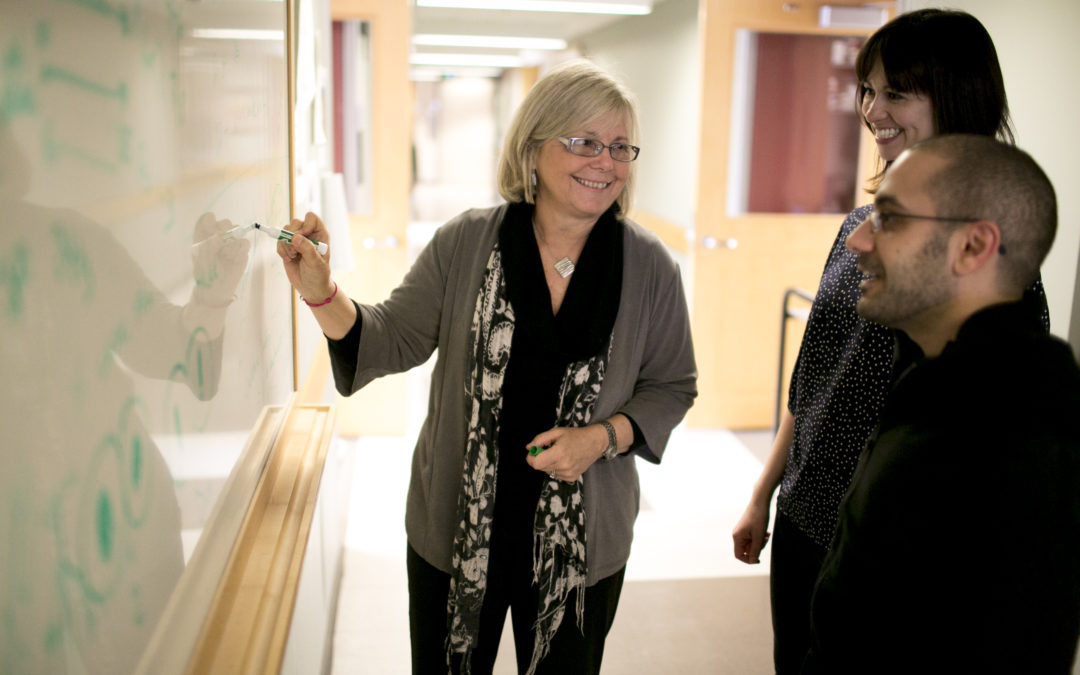Article by Jasenka Piljac Žegarac, PhD for ASCO Daily News | May 17, 2019
Joan S. Brugge, PhD, the Louise Foote Pfeiffer Professor of Cell Biology at Harvard Medical School and Director of the Harvard Ludwig Cancer Center, has been named the recipient of the 2019 Science of Oncology Award for a career dedicated to understanding the cellular pathways and processes that drive tumorigenesis and therapeutic resistance. During her honorary lecture on June 2, she will discuss intratumoral heterogeneity as it relates to cancer evolution and therapeutic resistance.
As a postdoctoral fellow at the University of Colorado Medical Center, Dr. Brugge was the first to identify and characterize a retroviral oncogene product—the SRC protein encoded by Rous sarcoma virus (RSV). She is also credited with providing many other insights on oncogene functions, including a comprehensive understanding of the mechanisms that are associated with early alterations in cancer cells that allow them to survive outside their natural niches and overcome apoptotic and oxidative stresses. Her current research projects are focused on providing a deeper understanding of breast and ovarian cancer heterogeneity, mechanisms of therapeutic resistance, and early premalignant changes in cancer-prone women with mutations that predispose them to breast cancer.
Dr. Brugge has been recognized for her groundbreaking accomplishments in oncology on numerous occasions: she received the American Cancer Society Medal of Honor (2016), the Hope Funds for Cancer Research Award of Excellence (2016), the Distinguished Woman Scientist Award (2016), and the Breast Cancer Research Foundation Jill Rose Memorial Award (2015).
During an interview with the ASCO Daily News, she reflected on the memorable moments in her career and discussed current research interests and challenges facing the field.
Q: What were the main influences on your career path?
Dr. Brugge: My sister was diagnosed with brain cancer at age 21, which really motivated me to learn as much as I could about the causes of cancer. At the time, I was a math major, and when I met Frank Mayfield, MD a neurosurgeon at the University of Cincinnati who was treating my sister, I asked him what he knew about the causes of cancer. He directed me to the literature about the viral causes of cancer, which led me to do an independent study on viruses and cancer at Northwestern University and eventually change my major from math to biology. Following, I did an internship at Jackson Labs and completed my graduate studies in the Department of Virology at Baylor College of Medicine.
The other major event that affected my career direction was taking time off from academics to transition to the scientific director of ARIAD Pharmaceuticals. This experience was influential at many levels; it exposed me to all the issues associated with bringing an embryonic idea to the clinic and provided a crash course in personnel management. When I decided to go back to academics, I had a very different perspective and completely changed my research direction. This experience also enabled me to take on several leadership roles in academia.
Q: What is the focus of your research now?
Dr. Brugge: One of the focuses is on understanding therapeutic resistance and factors that influence it, including cancer heterogeneity. Within those two main topics, we have projects on several different subthemes.
We were lured into this area about 8 years ago when Taru Muranen, PhD, a fellow in our laboratory who used 3D tumor spheroid cultures, noticed that tumor cells that were adjacent to the extracellular matrix were highly resistant to PI3K inhibitors. Through our collaboration with Gordon B. Mills, MD, PhD, we found that those cells activate an adaptive response that leads to the upregulation of the cancer survival program and prevents cell killing. We were then able to verify that mechanisms like this exist in vivo using an in vivo mouse model of HER2-positive breast cancer, where we showed that tumor cells that were adjacent to the extracellular matrix were highly resistant to therapies.
These discoveries have led us to conduct more systematic analyses of large numbers of patient-derived xenografts to understand how broad of an effect these adaptive responses have. Our focus is on breast and ovarian tumors.
To better understand the mechanisms driving therapeutic resistance, we are also looking at the role of antioxidants in tumor progression. Tumors that are able to upregulate antioxidant adaptive responses are more resistant to cancer therapies. Our goal is to identify the specific drivers of this adaptive response and develop strategies to block them. Lung tumors are the best models for studying antioxidant programs because genes that regulate antioxidant responses are mutated in a reasonable subset of these tumors.
Tumor heterogeneity is our second major area of focus. We’re using different single-cell technologies to understand the mechanisms responsible for intratumoral heterogeneity and therapeutic responses. We are conducting these studies within individual breast and ovarian tumors, which are well known for intratumoral heterogeneity.
Q: Can you tell us about the novel area of research you are pursuing in breast cancer?
Dr. Brugge: We currently have a project that is focused on identifying the earliest changes in breast tissue of women who carry BRCA mutations but have not developed cancer yet. We are working on identifying the nature of these changes using single-cell profiling technologies that allow us to look at small populations of cells that are masked when the whole tissue is analyzed in bulk. Although these data haven’t been published yet, we’ve identified subpopulations of breast cells that are altered in women who carry these mutations, which can aid us in both early detection of abnormal lesions and developing therapies aimed at preventing cancer progression.
Q: As a thought leader in cancer research, can you identify the knowledge gaps that stand in the way of more effective cancer therapies?
Dr. Brugge: One of the things that I am particularly interested in is applying what we learned about cancer so far to the development of therapies that can be used across different communities worldwide. If we want to treat cancer in areas with limited access to technologies and infrastructure necessary for personalized cancer therapies, it is important to identify common vulnerabilities of larger subsets of cancers.
I think that, in time, we will be able to find common tumor and immune states that are invoked by different subsets of oncogenic alterations, so that we can develop therapies that would target these states as opposed to the individual oncogenes that are driving them. These therapies would likely consist of combinations of four or five drugs.
–Jasenka Piljac Žegarac, PhD
Read the full article here.

